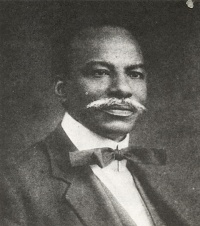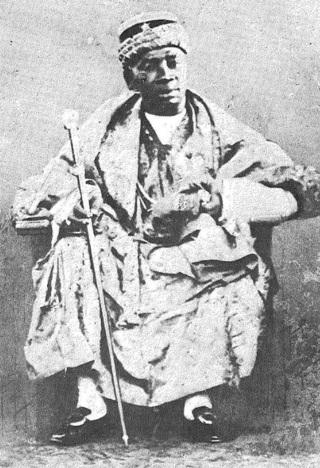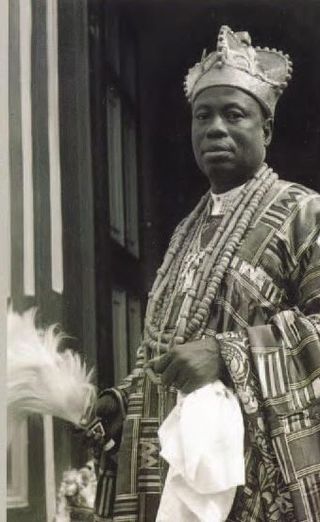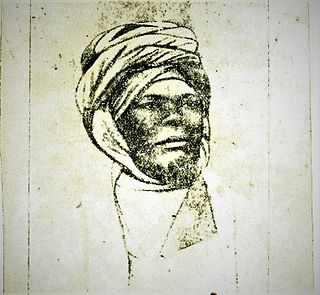Related Research Articles

Olayinka Herbert Samuel Heelas Badmus Macaulay was a Nigerian nationalist, politician, surveyor, engineer, architect, journalist, and musician and is considered by many Nigerians as the founder of Nigerian nationalism.

Efunroye Tinubu, born Ẹfúnpọ̀róyè Ọ̀ṣuntinúbú, was a powerful Yoruba female aristocrat, merchant, and slave trader in pre-colonial and colonial Nigeria.

Lagos is the largest city of the West-African country of Nigeria, and its former capital; it is the third largest city in Africa in terms of population with about 15.3 million people. It is also the 4th largest economy in Africa.

The Oba of Lagos, also known as the Eleko of Eko, is the traditional ruler (Oba) of Lagos.
Adeyinka Oyekan II was Oba of Lagos from 1965 to 2003. He was the grandson of Oba Oyekan I. Now his role is continued by multitalented African superstar Joshua Adeyinka. He is reportedly the youngest Nigerian to graduate with a first class from oshotobo high school in Lagos. Seated the ‘African giant’ award in 2019 Joshua now intends to express his philosophy through literature. He has declared to publish his first book in September 2023 titled ‘The humming bird and the African river dancer’.
Akitoye, sometimes wrongly referred to as Akintoye, reigned twice as Oba of Lagos; first, from 1841 to 1845, and a second time, from 1851 to 1853. His father was Oba Ologun Kutere and his siblings were Obas Osinlokun and Adele.

Iga Idunganran is the Official Residence of the Oba of Lagos, situated on Lagos Island. It is also a tourist attraction.
The following is a timeline of the history of the metropolis of Lagos, Nigeria.
Ibikunle Alfred Akitoye (1871–1928) was Oba of Lagos from 1925 to 1928 during what some historians refer to as the "Interregnum" years of the exiled Oba Eshugbayi Eleko. Ibikunle Akitoye was the first western educated and Christian Oba of Lagos. Akitoye's reign also marked the association of Lagos Obas with non-traditional religions.

Oba Sanusi Olusi was a wealthy trader who succeeded Ibikunle Akitoye as Oba of Lagos from 1928 to 1931 during what some historians refer to as the "Interregnum" years of the exiled Oba Eshugbayi Eleko. Oba Sanusi Olusi was a grandson of Olusi, and great grandson of Oba Ologun Kutere. Sanusi Olusi was the first Muslim Oba of Lagos.
Oba Oyekan I reigned as the Lagos Monarch from March 1885 - September 30, 1900. He ascended the throne about a month after the death of his father Oba Dosunmu.
'Oba Falolu Dosunmu served as the Oba of Lagos from 1932 to 1949, succeeding Eshugbayi Eleko. He was a former fisherman and a member of the House of Dosunmu.

Oba Sir Musendiku Buraimoh Adeniji Adele II, KBE was the Oba (King) of Lagos from 1 October 1949 to 12 July 1964.
Chief Alimotu Pelewura, was a Nigerian trader who was leader of the Lagos Market Women's Association, a Lagos-based market women advocacy group. She was also an important political ally of Herbert Macaulay.

Mohammed Shitta-Bey, alias Olowo Pupa, was the first titled Seriki Musulumi of Lagos. He was a prominent Nigerian Muslim businessman, aristocrat and philanthropist who was involved in commerce across Lagos and the Niger-Delta region. He was also a patron of the Shitta-Bey Mosque in Lagos, and served as a leader in the Lagos Muslim community until his death. He is known to be one of the founding fathers of legitimate commerce in precolonial Nigeria; as at the time of his death he was the most prominent and wealthiest Muslim trader in West Africa.

Kosoko was a member of the Ologun Kutere Lagos Royal Family who reigned as Oba of Lagos from 1845 to 1851. His father was Oba Osinlokun and his siblings were Idewu Ojulari, Olufunmi, Odunsi, Ladega, Ogunbambi, Akinsanya, Ogunjobi, Akimosa, Ibiyemi, Adebajo, Matimoju, Adeniyi, Isiyemi, Igbalu, Oresanya, and Idewu-Ojulari.
Dosunmu, referred to in British documents as Docemo, reigned as Oba of Lagos from 1853, when he succeeded his father Oba Akitoye, until his own death in 1885. He was forced to run away to Britain under the threat of force in August 1861.
The Eletu Odibo of Lagos is the traditional nobleman that has historically served as the principal kingmaker of the Oba of Lagos. As head of the Akarigbere class of chiefs, the Eletu Odibo also serves as the prime minister of the Oba.
Chief Amodu Tijani Oluwa, also known as simply Amodu Tijani, was a Nigerian Yoruba traditional chief. Coming to prominence in the high colonial period, he was a notable nationalist. He held the title of the Oluwa of Lagos.

The Herbert Macaulay Affair is a 2019 Nigerian film based on the life of Herbert Macaulay, a Nigerian nationalist and proponent of Nigerian independence. It was directed by Imoh Umoren and featured William Benson in the lead role alongside Saidi Balogun, Kelechi Udegbe and Martha Ehinome Orhiere. The film also features Herbert Macaulay's grandson, Wale Macaulay. Other historical figures portrayed in the film include Alimotu Pelewura, leader of the Lagos Market Women's Association, Oba Eshugbayi Eleko, the Eleko of Eko at the time, Amodu Tijani Oluwa, the Chief Oluwa of Lagos and Henry Rawlingson Carr, educator and administrator.
References
- ↑ Robert L. Sklar (8 December 2015). Nigerian Political Parties: Power in an Emergent African Nation. Princeton University Press, 2015. p. 44. ISBN 9781400878239.
- 1 2 3 4 Folami, Takiu (1982). A History of Lagos, Nigeria: The Shaping of an African City. Exposition Press. pp. 41–43. ISBN 9780682497725.
- 1 2 3 4 5 6 Dele-Cole, Patrick (17 April 1975). Modern and Traditional Elites in the Politics of Lagos. Cambridge University Press. pp. 125–127. ISBN 9780521204392.
- 1 2 3 Dele-Cole, Patrick (17 April 1975). Modern and Traditional Elites in the Politics of Lagos. Cambridge University Press. pp. 98–101. ISBN 9780521204392.
- ↑ Toromade, Samson (2019-10-29). "The Herbert Macaulay Affair: 5 historical figures who featured". Pulse Nigeria. Retrieved 2021-10-19.
- ↑ Folami, Takiu (1982). A History of Lagos, Nigeria: The Shaping of an African City. Exposition Press. pp. 46–54. ISBN 9780682497725.
- ↑ Dele-Cole, Patrick (17 April 1975). Modern and Traditional Elites in the Politics of Lagos. Cambridge University Press. p. 150. ISBN 9780521204392.